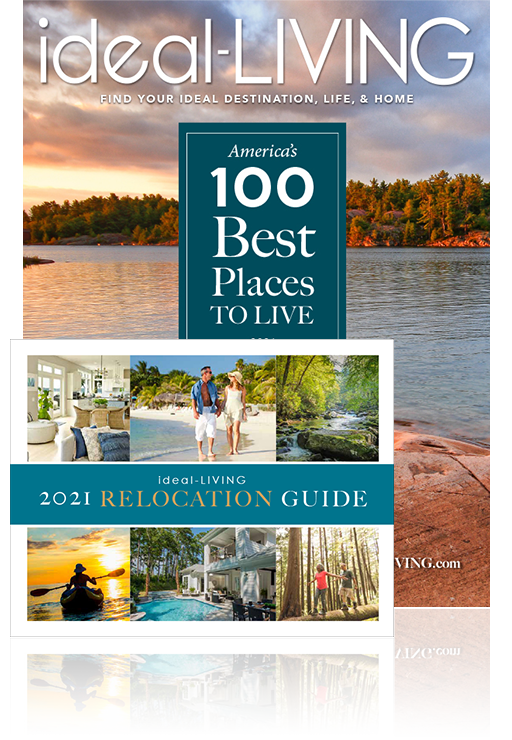Retiring Abroad Alone
Request Your Free Relocation Guide

Guide to Retiring Abroad Alone
Retirement marks the beginning of a new chapter in life, a time ripe with opportunities for personal growth, exploration, and the fulfillment of long-held dreams. For an increasing number of U.S. citizens, this chapter includes the exciting prospect of retiring abroad—alone. While the idea of moving to a foreign country without a partner or group may seem daunting to some, it presents a unique adventure that promises self-discovery, significant cost savings, and an enhanced quality of life.
At Ideal Living, we understand that the journey to retiring abroad alone is as much about the inner voyage as it is about the physical move. It's a chance to redefine your identity, pursue passions without compromise, and engage with the world in a profoundly personal way. Whether you're drawn to the sandy beaches of Belize, the historic towns of Portugal, or the vibrant cultures of Southeast Asia, retiring alone abroad offers an unparalleled opportunity to craft a retirement that's entirely your own.
In this guide, we'll explore the myriad opportunities that come with solo retirement abroad, provide you with the tools to choose your perfect destination, and share practical advice on navigating the logistics and legalities. We'll also offer tips on building a new community, managing your finances, and ensuring your health and well-being are paramount. So let's embark on this journey together—your solo retirement adventure awaits!

Why Retire Abroad Alone?
Choosing to retire abroad alone is a decision that can redefine the concept of freedom and personal growth in your golden years. While the prospect may seem intimidating at first, it comes with a wealth of benefits that can enhance your retirement experience significantly.
- Complete Autonomy in Decision-Making: When you retire abroad alone, every choice—from where you live to how you spend your days—is yours and yours alone. This autonomy allows you to design a lifestyle that aligns perfectly with your preferences, interests, and retirement goals.
- Cost-Effective Living: Many destinations popular among expatriates offer a lower cost of living compared to the United States, allowing your retirement savings to stretch further. This financial advantage can afford you a more comfortable lifestyle, access to better healthcare, and the ability to indulge in new experiences.
- Cultural Enrichment: Immersing yourself in a new culture can be a profoundly enriching experience. Living abroad alone challenges you to engage more deeply with the local community, customs, and language, providing a more authentic and rewarding experience.
- Personal Growth: Stepping out of your comfort zone and navigating life in a new country can lead to significant personal growth. You'll develop new skills, gain confidence, and perhaps discover aspects of yourself that you were previously unaware of.
- Social Opportunities: Retiring abroad provides unique opportunities to meet people from diverse backgrounds, both locals and fellow expatriates. Being alone can actually make it easier to form new friendships, as you're more likely to reach out and connect with others.
- Health and Wellness: Many retirees abroad find that their health improves thanks to a more relaxed lifestyle, better climate, and access to fresh, healthy food. Engaging in new activities and hobbies can also contribute to your physical and mental well-being.
- Adventure and Exploration: Retirement is the perfect time to explore the world, and doing so alone means you can follow your curiosity wherever it leads. Whether it's trekking through the mountains, learning a new language, or simply enjoying a different way of life, the adventure is all yours.
In the following sections, we'll guide you through the process of making this life-changing move, providing you with the insights and resources you need to embark on your solo retirement journey with confidence and excitement.
Choosing Your Perfect Destination
Embarking on a solo retirement abroad begins with selecting a destination that aligns with your lifestyle preferences, budget, and personal aspirations. Here are some key factors to consider when choosing your perfect retirement haven:
Cost of Living
One of the primary attractions of retiring abroad is the potential for a more affordable lifestyle. Research the cost of living in potential destinations, including housing, healthcare, groceries, and entertainment, to ensure they align with your budget.
Healthcare
Quality healthcare is crucial, especially as you age. Investigate the healthcare facilities, insurance options, and accessibility of medical services in your potential new home to ensure you'll have the support you need.
Climate and Environment
Whether you prefer sunny beaches, tranquil countryside, or vibrant cities, the climate and environment play a significant role in your daily life. Consider whether you want a change from your current climate or if you prefer something similar.
Safety and Stability
Look into the political stability, crime rates, and overall safety of the countries you're considering. Living in a secure and stable environment is essential for a peaceful retirement.
Language and Communication
While living in a country where you don't speak the local language can be an exciting challenge, it can also pose difficulties. Consider whether you're willing to learn a new language or if you'd prefer a destination where English is widely spoken.
Expat Community
A supportive expat community can be invaluable for solo retirees. Check if there are active expat groups, social clubs, or networks that can help you settle in and make new friends.
Visa and Residency Requirements
Understand the visa and residency requirements for your chosen destination. Some countries offer retirement visas or special residency programs for retirees, which can simplify the process of moving and living abroad.
Accessibility
Consider how easy it is to travel to and from your chosen destination, especially if you plan to visit family or friends back home. Also, think about the ease of getting around within the country, particularly if you don't plan to drive.
By thoroughly researching and considering these factors, you can make an informed decision about your ideal retirement destination. In the next sections, we'll provide tips on preparing for your move, adapting to your new life abroad, and building a fulfilling solo retirement experience.
Navigating Legalities and Logistics
Embarking on a solo retirement abroad requires careful consideration of various legalities and logistical aspects to ensure a smooth transition. Here's a guide to help you navigate through the key steps:

Visa and Residency Permits:
Investigate the specific visa or residency permit requirements for retirees in your chosen country. Each country has different regulations, and some offer specific retirement visas with benefits for expats. Ensure you meet all criteria and have the necessary documentation before making your move.
Financial Planning:
Understand the cost of living in your new country and plan your finances accordingly. Consider your retirement income sources, including pensions and Social Security benefits, and how they will be affected by your move. Some countries have tax agreements with the U.S. to prevent double taxation, so it's worth consulting with a tax advisor.
Healthcare Arrangements:
Secure your healthcare coverage before relocating. Research the healthcare system of your destination country and decide whether you'll rely on the local system, private insurance, or a combination of both. Ensure you have adequate coverage for your health needs.
Property and Accommodation:
If you plan to buy property, understand the local real estate laws and market conditions. Alternatively, renting can be a flexible option while you get accustomed to your new environment. Consider your desired lifestyle, budget, and the amenities you need when choosing your home.
Legal Matters:
Address legal matters such as wills, powers of attorney, and other essential documents. Laws vary by country, so it's crucial to ensure your legal affairs are in order according to the regulations of your new home country.
Banking and Finances:
Set up a bank account in your new country and understand the best ways to transfer funds internationally. Familiarize yourself with the local currency, banking system, and any potential foreign exchange risks.
Moving Your Belongings:
Decide what to bring with you and what to leave behind. Research international moving companies, shipping costs, and customs regulations. It's often more cost-effective and simpler to downsize and purchase new items upon arrival.
Cultural Preparation:
Understanding the local culture, customs, and etiquette can significantly enhance your integration into the community. Learning the basics of the local language, if it's not English, can also be incredibly beneficial.
By meticulously planning and addressing these legalities and logistics, you can set the stage for a successful and enjoyable retirement abroad. In the next section, we'll discuss how to build a new social network and integrate into your new community as a solo retiree.
Building a New Community
Transitioning to retirement abroad alone offers a unique opportunity to forge new connections and build a supportive community. Here's how you can cultivate your social network and integrate into your new surroundings:

Embrace Local Activities:
Participate in local events, festivals, and community gatherings. These are excellent opportunities to meet people and learn about the local culture. Whether it's a cooking class, a dance workshop, or a neighborhood celebration, engaging in community activities can lead to meaningful friendships.
Join Clubs and Groups:
Look for clubs or groups that align with your interests or hobbies. Many expat communities have clubs for activities like hiking, reading, art, or language exchange. These groups provide a supportive environment where you can connect with like-minded individuals.
Volunteer:
Offering your time to volunteer initiatives can be incredibly rewarding. Not only does it allow you to give back to your new community, but it also helps you meet people and establish connections. Look for local charities, schools, or environmental projects where you can contribute.
Attend Expat Meetups:
Many countries have active expat communities that organize meetups, social events, and networking opportunities. These gatherings can be a valuable resource for sharing experiences, getting advice, and making friends who are also adjusting to life abroad.
Take Language Classes:
If you're moving to a country where English isn't the primary language, taking language classes can accelerate your integration. It allows you to communicate more effectively with locals and shows your commitment to embracing the new culture.
Be Open and Approachable:
Sometimes, building a new community simply requires being open to new experiences and people. Don't hesitate to start conversations, ask questions, and show interest in others' lives. Genuine curiosity and friendliness can go a long way in forming lasting relationships.
Stay Connected Online:
Utilize online forums, social media groups, and expat websites to connect with others in your area. These platforms can provide valuable information, answer your questions, and introduce you to people with similar experiences.
Maintain Balance:
While it's essential to build a new community, remember to maintain a balance between socializing and enjoying your own company. Embrace the independence and personal growth that comes with solo retirement abroad.
By actively engaging with your new environment and its inhabitants, you can create a fulfilling and vibrant social life in your retirement destination. In the following section, we'll explore practical tips for managing day-to-day living as you settle into your new home abroad.
Safeguarding Your Health and Well-Being
Maintaining your health is crucial when retiring abroad alone. Without the immediate support of family or a partner, it's important to have a solid plan for managing your health care. Here are strategies to ensure you stay healthy and have access to necessary medical services:
Healthcare System Familiarization:
Research the healthcare system of your chosen retirement destination. Understand how the local healthcare works, what services are available, and how you can access them. Knowing whether you'll rely on public healthcare, private insurance, or a combination of both is essential for your peace of mind.
Medical Network Development:
Once you arrive, take the time to find a good doctor, dentist, and any other specialists you might need. Recommendations from local expats or community groups can be invaluable in finding reputable healthcare professionals.
Emergency Plan:
Establish an emergency plan that includes knowing the location of the nearest hospital or clinic and having a list of emergency contacts. Keep this information easily accessible in case of urgent medical needs.
Health Insurance:
Secure comprehensive health insurance that covers you in your new country. If your destination country has a public healthcare system, find out how you can benefit from it and what supplemental insurance you might need.
Pharmacy and Medications:
Identify a reliable pharmacy and ensure you can access any medications you regularly take. Some expats find it helpful to bring an initial supply of medication until they can set up a local prescription.
Mental Health:
Don't overlook your mental well-being. Moving and adapting to a new country can be challenging, and it's important to recognize and address any feelings of loneliness or anxiety. Engaging with the community, staying active, and maintaining hobbies can help support your mental health.
Wellness Routine:
Establish a routine that includes regular exercise, a balanced diet, and activities that bring you joy. Whether it's walking, yoga, gardening, or painting, find what keeps you physically and mentally stimulated.
Regular Check-ups:
Stay proactive about your health by scheduling regular check-ups and screenings. This is especially important as you age and if you're managing chronic conditions.
By prioritizing your health and well-being, you can enjoy a more fulfilling and comfortable retirement abroad. Next, we'll explore how to manage your finances effectively while living overseas, ensuring you can enjoy your retirement years without financial stress.
Managing Finances and Property While Retiring Abroad Alone
Navigating financial management and property ownership is a crucial aspect of retiring abroad alone. Ensuring financial stability and understanding the implications of property ownership in a foreign country will contribute significantly to a stress-free retirement. Here's how you can effectively manage your finances and property as a solo retiree:
- Financial Planning: Before making the move, create a comprehensive financial plan that covers your living expenses, healthcare, travel, and emergencies. Factor in the cost of living in your new country and any fluctuations in currency exchange rates that could impact your budget.
- Banking: Open a local bank account to manage daily expenses more efficiently. Research banks that offer favorable rates for expatriates and understand any tax implications. It's often wise to maintain a bank account in the U.S. for receiving Social Security payments or managing stateside financial obligations.
- International Transactions: Familiarize yourself with the most cost-effective methods for international money transfers to minimize fees and get the best exchange rates. Services like TransferWise or Revolut can offer more favorable terms than traditional banks.
- Property Ownership: If you're considering buying property, understand the local real estate laws. In some countries, there are restrictions on foreign property ownership, so it's essential to do thorough research or consult with a local real estate attorney.
- Rental Management: If you own property in the U.S., decide whether you'll sell, rent it out, or leave it vacant. If you choose to rent it out, consider hiring a property management company to handle tenant issues and maintenance, especially since you'll be abroad.
- Tax Considerations: Stay informed about your tax obligations both in the U.S. and your new country of residence. The U.S. requires its citizens to file taxes regardless of where they live, so it may be beneficial to consult with a tax advisor who specializes in expatriate affairs.
- Retirement Accounts: Understand how living abroad affects your retirement accounts. Make arrangements to access these funds as needed and be aware of any potential penalties or tax implications.
- Legal Matters: Ensure that your will, power of attorney, and other legal documents are updated and valid in your new country of residence. It's also wise to understand the inheritance and estate laws in your new home country.
By proactively managing your finances and property, you can enjoy your retirement abroad without unnecessary financial worries. Next, we'll discuss how to stay connected with your family and friends back home, fostering relationships that provide support and joy during your retirement years.
Further Resources for Prospective Solo Retirees
Explore our extensive collection of guides, designed to offer you detailed insights into retiring abroad. These guides cover various aspects, from choosing the right country to understanding the nuances of international living.
- Complete Guide to Retiring Abroad
- Top 8 Best Expat Countries Around the World
- Guide to Tax-Free Retirement Countries
- Easiest Countries to Retire to Around the Globe
- Guide to International Taxes
- Guide to Social Security While Retiring Abroad
- Countries with the Best Health Insurance
- Best Countries to Retire Abroad for US Citizens
Start Your Retirement Journey with Ideal-Living
Start your international retirement journey today with ideal-Living. Stay informed with the latest trends, professional advice, and our quarterly publication, all while enjoying a free relocation guide. Discover the potential of a rewarding retirement abroad with Ideal-Living's expert support.
© 2026 ideal-LIVING Magazine • 265 Racine Dr #201 • Wilmington, NC 28403 • 910.763.2100

